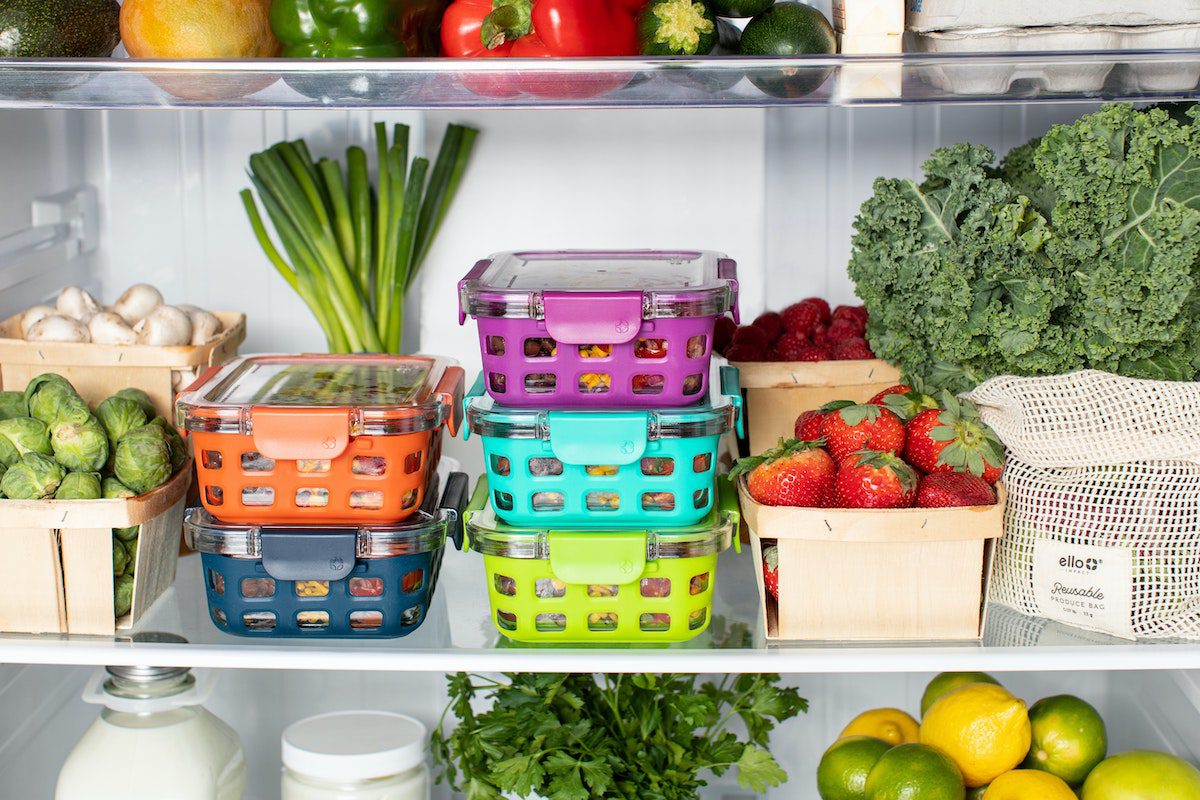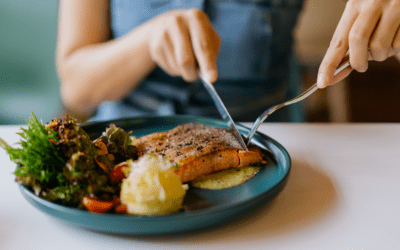By, Chelsea Fechtner, MScN, CN
Planning and executing a healthy dinner is not always easy! Especially for those that are working on wellness goals or feeding other people on a regular basis. Even as a foodie nutritionist, I still can find myself in a rut with cooking sometimes! Below are a few strategies that I utilize in my own kitchen as well as with my wellness coaching patients.
Start with Balance
Eating balanced meals throughout the day is one of the best ways to support fertility and PCOS management. Balanced meals help regulate blood sugar and hormones, as well as support stable mood and energy levels. A good starting point for building balanced meals is making sure that there are carbohydrates, protein, and fat on each plate. Fiber-rich carbs like fruits, veggies, whole grains, beans, and lentils are all fertility-supportive options to include. Plant proteins like chickpeas and hemp seeds, as well as omega-3 rich salmon are nourishing proteins to consider. Finally, healthy fats like olive oil, avocado, nuts, and seeds add additional flavor and staying power to a meal or snack.
Seasonal Eating
Do you ever find yourself gravitating towards the same five fruits and vegetables at the grocery store each week? Eating seasonally is a way to mix things up and likely save money as well. Seasonal produce tends to be front and center at the grocery store and is often on sale and the freshest. Shopping at the farmer’s market or signing up for a local produce CSA box are both ways to take seasonal eating to the next step! One strategy for building confidence with seasonal cooking is to keep a general outline of produce on your grocery list and choose the seasonal options that are on sale at the store or available at the market. For example, instead of adding spinach and carrots to your grocery list, write down leafy green and root vegetable. That will open up the options and might end up looking like kale and beets in the winter or romaine lettuce and fingerling potatoes in the summer!
Repurposing Leftovers
If the idea of meal prepping a week’s worth of meals seems intimidating, trust me, you are not alone! Repurposing leftovers is a way to prep ahead without the stress and rigidity of preparing and portioning out a ton of meals. Instead, this concept is all about cooking once and creatively building meals throughout the week. For example, a tray of cubed and roasted sweet potatoes is a delicious side to your favorite protein, and can be also added to a frittata, quinoa salad or green salad. Whole grains like quinoa, brown rice, and farro are also great for repurposing throughout the week. Overall, this strategy is all about batch cooking and then utilizing the leftovers in different ways rather than eating the same meal all week. SRM’s wellness nurse, Anika loves to repurpose leftovers when she cooks for her family. Below are two of her favorite recipes!
Alternate Proteins
Like many other aspects of home cooking, it can be easy to fall into a rut with proteins by sticking with the basic lean meats like chicken and turkey. Try mixing up your proteins by including fertility-supportive options like salmon, lentils, chickpeas, and chia seeds! Crispy baked chickpeas are delicious on a salad and chia pudding makes a great balanced breakfast option. Alternatively, you can start by swapping out chicken for fish or tofu in your favorite sheet-pan dinner recipe.
Healthy Fats
Understanding and navigating healthy and unhealthy fats is important for fertility and PCOS management. Trans fats have been shown to have a negative impact on fertility while anti-inflammatory omega-3 fats actually support egg quality. Trans fats are often labeled as partially hydrogenated oils and can be found in processed foods and fried foods. Highly processed vegetable oils like canola, soybean and corn oil are pro-inflammatory and should also be minimized or avoided. Healthy fats to emphasize for fertility and PCOS are extra-virgin olive oil, avocados, nuts, seeds, and fatty fish. Including saturated fat in moderation and in the form of organic whole milk dairy products, grass-fed meat, organic eggs, and coconut is also nourishing for fertility. The best way to stock up on these healthy fats is to slowly add them to your grocery list to build your pantry over time. Start by adding 1-2 items each week to avoid a hefty grocery bill from including all of them at once.
Cooking more at home provides many opportunities to nourish your fertility and help manage PCOS symptoms. Over time, you will build up your fridge and pantry staples list and hopefully find that healthy cooking feels more accessible when you have the tools needed to build healthy meals.
SRM Nurse Anika’s family favorites for repurposing leftovers:
Tuna White Bean Salad
Serves 2-4
Recipe provided by Anika Bertoldi, RN
Ingredients:
- 2 cans of high-quality oil packed or water packed wild tuna (Wild Planet or Safe Catch are good brands)
- 1 can of cannellini or great northern white beans, drained and rinsed
- 1 medium sized shallot, finely diced
- 2 tablespoons fresh chopped dill
- ¼ cup chopped Italian parsley
- ¼ cup of drained capers or kalamata olives
- Zest of 1 organic lemon
- 2 tablespoons lemon juice
- 1 tablespoon red wine vinegar
- 1-2 tablespoons olive oil (depending on oil packed tuna and preference)
- Salt and pepper, to taste
- Optional: ½ teaspoon red pepper flakes
- Optional: ¼ cup toasted and chopped walnuts
Instructions:
- Mix everything together in a medium sized bowl and store refrigerated for up to 4 days in a glass container with lid.
- Sere over arugula, in butter lettuce leaves, with your favorite whole grain/seed cracker or cucumber slices, or on your favorite toasted bread.
Greek Chop Salad
Serves 4-6
Recipe provided by Anika Bertoldi, RN
Ingredients:
- 2 cans of garbanzo beans, drained and rinsed
- 1 can of drained, rinsed, and thinly sliced hearts of palm or artichoke hearts chopped
- 1 large English cucumber, diced (ok to eat skin and seeds of these ones!)
- 1 cup of baby or cherry tomatoes, sliced in halves or quarters depending on size
- Optional: ½-1 cup of diced bell pepper of your choice
- ½ of your favorite pitted Greek olives, halved
- ½ cup of crumbled feta cheese
- ¼ of a red onion, diced (To cut the strong onion bite- soak diced onion in ice water for ~5 minutes and then drain before adding to salad)
- 2 tablespoons chopped mint
- 2 tablespoons chopped dill
- 2 tablespoons red wine vinegar
- 2-4 tablespoons olive oil, to taste
- Salt and pepper, to taste
Instructions:
- Mix everything together in a medium sized bowl and store refrigerated for up to 4 days in a glass container with lid.
- Serve the salad on it’s own – just grab a fork! Also can be served over your choice of greens with the addition of a protein like grilled chicken, or stuffed into a whole grain pita pocket with tzatziki or tahini sauce.
References:
- Chavarro, J., Rich-Edwards, J., Rosner, B. and Willett, W., 2007. Diet and Lifestyle in the Prevention of Ovulatory Disorder Infertility. Obstetrics & Gynecology, [online] 110(5), pp.1050-1058. Available at: https://journals.lww.com/greenjournal/Fulltext/2007/11000/Iron_Intake_and_Risk_of_Ovulatory_Infertility.17.aspx[Accessed 15 September 2021].
- Chavarro, J., Rich-Edwards, J., Rosner, B. and Willett, W., 2007. Dietary fatty acid intakes and the risk of ovulatory infertility. The American Journal of Clinical Nutrition, [online] 85(1), pp.231-237. Available at: https://academic.oup.com/ajcn/article/85/1/231/4649371?login=true [Accessed 15 September 2021].




